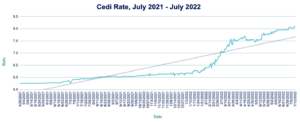The Cedi lost further ground against the dollar this week, trading at 8.27—a new record low—from 8.13 at last week’s close.

That came after Ghana’s central bank this week unexpectedly held rates at 19%, ending nine months of consecutive tightening amid concerns of slower growth and worsening economic conditions. Ghana’s Finance Minister Ken Ofori-Atta outlined plans to reduce spending targets and narrow the budget deficit during the current financial year.
Meantime, Ghana’s export-import bank and USAID committed $35m to help maintain the country’s status as Africa’s top yam exporter. Given the ongoing global supply chain disruptions and inflationary pressures, we expect to see the Cedi depreciate further in the short term.
Africa bucks IMF global growth slowdown outlook
The IMF said it expects global growth to slow to 3.2% this year as the disruption to food and fuel supplies caused by Russia’s war in Ukraine weighs on the economic outlook around the world. “Low-income countries whose people were already experiencing acute malnutrition and excess mortality before the war, especially in sub-Saharan Africa, have suffered a particularly severe impact,” the IMF wrote in its World Economic Outlook report this week.
Even so, while revising its global growth forecast lower, the IMF said the outlook for countries in sub-Saharan Africa on average remain unchanged or positive, “reflecting the effects of elevated fossil fuel and metal prices for some commodity-exporting countries.” South Africa’s economy has improved since the IMF’s last update in the April, with growth for 2022 now projected at 2.3%, up from 1.9% previously, though the outlook for 2023 remains just 1.4%.
Nigeria stands alone with Saudi Arabia as the only countries set to buck the global growth slowdown in 2023 thanks to higher oil export revenue. The IMF projected Nigeria’s economy will grow by 3.2% in 2023, up from the 3.1% forecast in April, while keeping its 2022 outlook unchanged at 3.4%. For Africa’s commodity exporters, the higher prices should continue to act in the long-term as a partial hedge against the global downward pressure on emerging market currencies for as long as the supply disruption persists.
Naira drops 6% in week to all-time low

The Naira depreciated sharply this week to a fresh record low, tumbling 6% to 668 from 630 at last week’s close amid severe dollar demand pressures on the unofficial market.
That steep fall was exacerbated by more Nigerians buying cryptocurrencies, the president of the Association of Bureau de Change Operators of Nigeria told Bloomberg.
Meantime, the National Labour Congress announced plans for a three-day strike to follow this week’s two-day nationwide protest as Nigeria’s public universities remain closed.
We expect the Naira to continue its precarious slide as panic buying and Naira drops 6% in week to all-time low already elevated demand intensify pressure on the currency.
Weaker Rand stays shy of sinking to 17 levels
The Rand depreciated to 16.92 per dollar from 16.85 at last week’s close. The currency has avoided sinking beyond the 17 level following the South African central bank’s larger-than-expected 75 basis point rate hike last week.

President Cyril Ramaphosa this week announced a 10-point plan to regain control of South Africa’s spiraling electricity crisis. Measures include scrapping licencing for private energy projects, allowing the country’s power company Eskom to start buying electricity from private suppliers and an increased budget for power plant maintenance.
Looking ahead, we expect the Rand to continue to trade shy of the 17 handle, with no surprises from the US Federal Reserve’s 75 basis points hike, as well as an improved economic outlook for South Africa from the IMF.
Egyptian Pound dipping towards 19 levels
The Pound weakened marginally against the dollar this week, trading at 18.96 from 18.95 at last week’s close.

The IMF said this week that Egypt, which has entered talks for a new loan to support its economy, must impose tougher reforms to access further funds, including more private sector development and a reduced role for the state.
Strains on the economy have forced the government to add another one million families to its social safety net programme, which now stands at around 20 million—raising further financing pressures.
Against that backdrop, we expect to see the Pound continue heading towards the 19 level in the week ahead.
Record-weak Shilling set lower heading to Kenyan election month
The Shilling slipped to a new record low against the dollar, trading at 118.65/118.85 from 118.20/118.65 at last week’s close.

The global effects of Russia’s war in Ukraine and higher dollar demand from the manufacturing and energy sectors have continued to weigh on the currency, combined with uncertainty around the upcoming presidential election on August 9.
Kenya continues to chip away at its FX reserves, now standing at $7.7bn, sufficient for 4.46 months of import cover—below the East African Community’s threshold of 4.5 months. With dollar demand trending higher at month end, we anticipate further weakness for the Shilling in the week ahead.
Record low Ugandan Shilling poised for more weakness
The Shilling slumped to a record low this week, trading at 3874 from 3830 at last week’s close amid increased demand for dollars from offshore investors exiting Uganda’s local debt market.

Russia’s Foreign Minister Sergei Lavrov this week held talks with Ugandan President Yoweri Museveni in Entebbe.
Museveni is seeking Russian assistance to develop a nuclear power plant in the country—which would be the first in the East African region. We anticipate further weakness for the Shilling in the next seven days amid economic pressures.
Tanzanian Shilling steady at range held since June
The Shilling was trading flat against the dollar this week at 2332, in line with last week’s close and broadly where it has been trading since early June.

A report published this week by advisory firm GBS Africa showed that Dar es Salaam’s port is increasingly challenging Kenya’s ports for dominance over Indian Ocean-related trade.
The report also found that more landlocked countries such as Rwanda and Uganda are turning to Dar es Salaam due to congestion problems in Mombasa. We expect the Shilling to continue trading around the same levels in the near term. Any break and close beyond 2335 could lead to further weakening while the currency finds a new trading range.
Note to journalists: please feel free to quote from this briefing for news reports and let us know any requests for further comment or interviews via the contact details at the end, or by reply to this email. AZA is Africa’s largest non-bank currency broker by trading volume at over $1 billion annually. See https://www.azafinance.com
Issued by AZA. This Newsletter is produced as a service to our clients. It is prepared by our dealing professionals and is based on their understanding and interpretation of market events. AZA cannot be held responsible for any losses of whatever nature sustained as a result of action taken based on comments contained in this publication.
Gavin Serkin
[email protected]
+44 20 3478 9710










